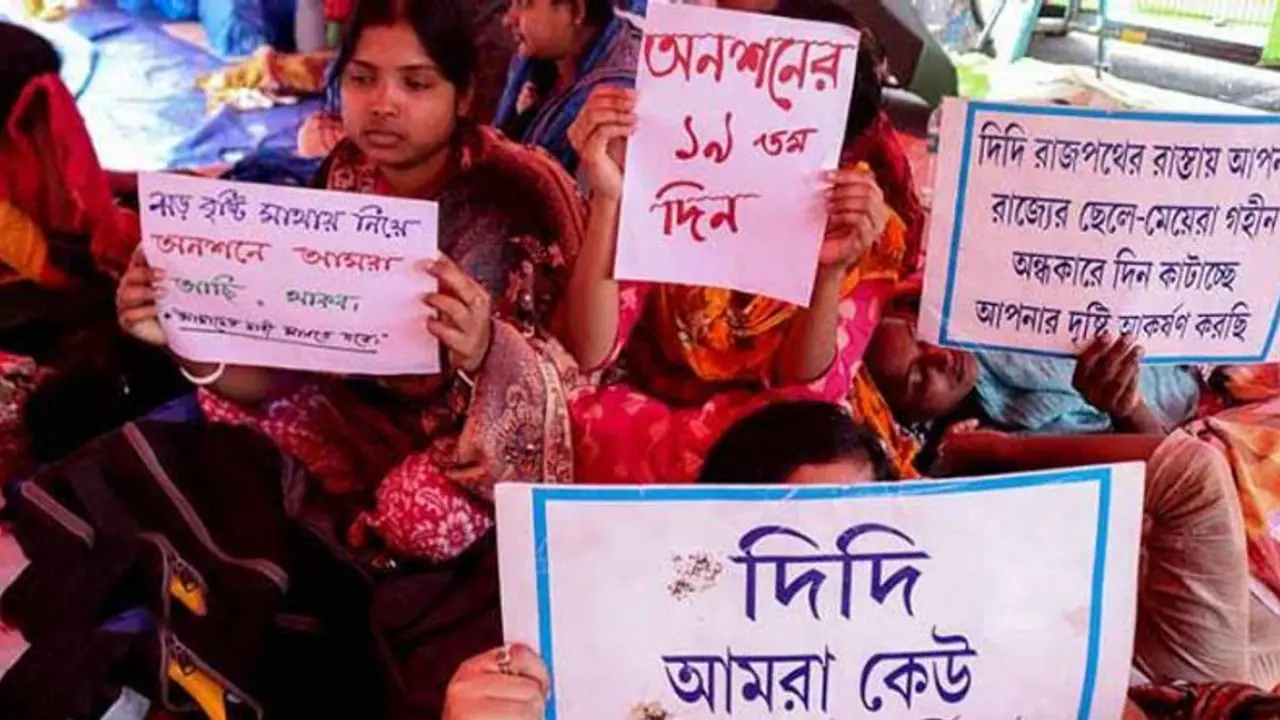Almost 80 successful SSC candidates have fallen ill while on hunger strike, asking for jobs promised to them. Pregnant protesters have reportedly suffered miscarriages. But while mediapersons celebrated pre-Holi bash at the venue of the protest, the Kolkata Press Club, police have threatened the young protesters with forcible eviction.
New Delhi: Fasting and feasting don't go hand in hand. But for many in the Bengali media, it does. Even as over 400 hapless yet successful candidates in West Bengal's School Service Commission (SSC) examination are sitting on a hunger strike over the last 26 days in front of the Kolkata Press Club, journalists congregate on the spot to party but not to cover the event.
The candidates are demanding an immediate filling of vacancies in the state schools. They began their indefinite hunger strike on February 28 on Mayo Road, which still continues. Within this nearly one month, there were multiple press conferences held at the Press Club, attended by the Bengali media but there has been almost no coverage of this unprecedented event.
In fact, on March 20, the journalists partied there for the upcoming Holi, as students lay hungry but determined to carry on with their protest.
Political favouritism in SSC exam?

The candidates want Bengal government to publish the entire list of candidates who qualified in the SSC examination along with the details of marks they got to notify the exact number of vacancies for teachers in the state-run schools. All of them sitting on hunger strike are successful candidates.
News agency IANS quoted Anindita Jana, a political science graduate from East Midnapore district, who is part of the protest, as saying, “I qualified in the SSC exam in 2016 in both written test and interview but haven't received any recruitment call so far. We want that the recruitment should start immediately.”
To put it simply, there was a recruitment test; candidates were selected but no appointment letters were issued.
What makes the matter murkier are allegations of undue favouritism extended to people with political connections. Former TMCP leader who recently joined the BJP, Shanku Deb Panda, has alleged that relatives of “political leaders” are being appointed while the successful candidates are left in the lurch.
Crushing dissent?

As the election nears, opposition parties queue up to the students, who have so far been ignored. From Bengal CPI(M) politburo member Biman Bose to BJP's Shanku Panda, many went to express solidarity. But the Kolkata Police, which has so far been silent, recently sprung to action and reportedly threatened the agitators to change their venue.
Police sources say the Indian Army, the Eastern Command headquarters of which is in close proximity to the Kolkata Press Club, inquired about the protest. But now, it's the same letter that is being used against the agitators, who claim the police threatened to move them forcibly if they refuse to vacate the area.
While it is not clear whether the Indian Army requested the police for such punitive action, police sources say the Army has merely inquired about the protestors. This is increasingly being seen as the Bengal government’s act of crushing dissent.
While many students have taken to Facebook Live and Twitter to talk about their plight, a majority of mainstream Bengali media stayed clear of it.
In their long struggle for justice, almost 80 protestors have fallen ill. A few of the protestors who were pregnant have reportedly suffered miscarriages.
Meanwhile, Bengal education minister Partha Chatterjee held three rounds of meetings with the agitators and formed a five-member expert committee to look into the grievances. But the protestors are unconvinced.
Even as the who’s who of Bengali media party inside, these protestors are fighting a lone battle, just outside the Kolkata Press club. Away from the spotlight, hungry, they prepare to fight another day.
